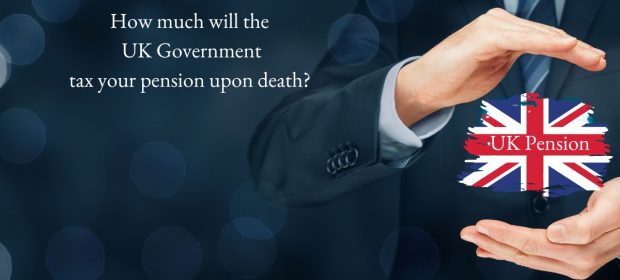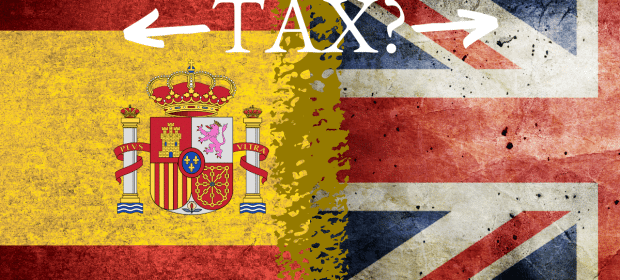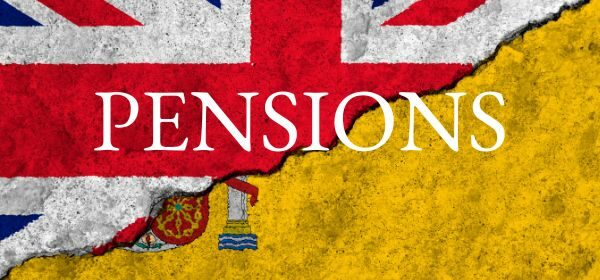Could the UK government take up to 60% of your pension?
The Institute for Fiscal Studies (IFS) published a paper on 15th December 2022 recommending that the UK government introduce a basic rate (20%) income tax charge and Inheritance Tax (IHT) at 40% on monies left in UK pensions on death, regardless of age.
How much could the UK tax my pension?
By Portugal team
This article is published on: 6th February 2023

Generosity of current rules
Under current rules, your pension can pass to your beneficiaries free of UK Inheritance Tax (IHT), rather than being subject to the standard 40% rate. Additionally, if you die before age 75, your beneficiaries do not need to pay any tax on drawdown/lump sums. If you die after 75, and your beneficiaries are UK tax resident, they are subject to income tax at their marginal rate.
This is what makes pensions so valuable for tax planning and advisers will usually recommend that they are maximised and preserved, and that other assets subject to IHT are used to fund spending first, to reduce the value of your estate.
What could change?
The IFS pointed out that the current tax rules on UK pensions are very generous and pensions have become a succession planning tool rather than one for retirement provision.
Experts are musing that the UK government could change these generous IHT rules; many say this is overdue. More worryingly, they are anticipating a potential change in 2023.
The IFS recommended that a basic 20% rate is applied to any pension savings left on death, irrespective of age. Also, the pension should form part of the deceased’s estate for IHT, incurring a further 40% tax.
Why the change?
Simply put, changing the pension IHT rules would fill a big hole in the Exchequer’s coffers by bringing millions of pensions into the IHT net. It would also persuade many people to start spending their pension pots and in turn, pay income tax on the drawdown during their lifetimes.
The report explained how the generous UK pension rules specifically in relation to IHT have caused a “bizarre situation” where instead of pensions primarily being an attractive structure for old-age-planning, they have become a lucrative IHT loophole. The IFS also pointed out, “if we are to have an inheritance tax at all, it should apply evenly across all forms of wealth.”
We have also seen pensions being periodically targeted over the past decades, with taxation and limits applied in the form of Annual Allowance, Money Purchase Annual Allowance and the continuing reduction of the Lifetime Allowance, from £1.8.m in 2011/2012 to £1,073,100 in the tax year 2022/2023 – all with the aim of curbing the tax benefits. There are even serious talks of bringing the increase in the UK State Pension age forward from 2046 to 2035.

Will this affect you?
Those with estates valued in excess of £325,000 (if single) or £650,000 (jointly), including pension values, would be affected by any potential change.
It is unclear how any potential change would be introduced, although the IFS has suggested phasing in changes. It is also unclear if existing benefits would be sheltered from the change or if the rules would be retrospective, thus catching all pension savers. Although, the IFS did say that even with phasing, there would be some retrospective taxation effect.
What should you do?
Of course, there is no guarantee this will happen, but if changes are imposed there may be little or no opportunity to restructure your pensions. As a non-UK resident, you can take action now and review your finances to ensure you are protected.
The Spanish State Pension
By John Hayward
This article is published on: 21st November 2022

How many years must one work in Spain to claim a Spanish State Pension?
When Brexit finally happened, one of the concerns that I had was regarding the bilateral agreement between the UK and Spain. I wanted clarification on whether years worked in the UK would continue to count towards the years required to qualify for the Spanish State Pension. The minimum number of years in the UK is 10 years but in Spain it is 15 years. Under the Trade and Cooperation Agreement made between the EU and the UK on 24th December 2020, and specifically the Article SSC.7: Aggregation of periods, it states that the periods of employment must be considered “as though they were periods completed under the legislation which it applies”.
How does this work in practice?
If someone has worked for 9 years in the UK and 14 years in Spain then, under the individual countries’ rules, neither minimum has been achieved. However, both countries’ rules are satisfied when adding the 9 to the 14 and vice versa. That is not to say that one would receive 23 years’ pension from either or both countries but merely that the person qualifies for a pension in both countries; 9 years’ pension in the UK and 14 in Spain. Details of how the pension is calculated can be found in my colleague Chris Burke’s article Claiming your UK State Pension whilst living in Spain/EEA.

Can you continue working in Spain whilst claiming a Spanish State Pension?
In the UK, you can receive your State Pension and continue to work. You will then only pay Class 4 National Insurance contributions, those associated with profit, as no further pension benefit will be accumulated. In Spain, you cannot claim your full State Pension entitlement if you continue working, and you do not employ anyone. However, it is possible to continue working beyond Spanish State Pension age and claim a reduced pension subject to certain conditions, one of these being that you must have achieved the minimum number of years to claim 100% of the Spanish State pension. This is currently 35 years but will be increasing over the next few years. You can once again apply the principle as discussed above in terms of adding the years in the UK to achieve this minimum.
To find out what your options are and how we can help you with your retirement planning, please contact me at john.hayward@spectrum-ifa.com or call/WhatsApp me on (0034) 618 204 731.
Removing Confusion on Spain and UK Tax Situation Especially Pensions
By Barry Davys
This article is published on: 23rd May 2022

It is clear from calls and messages to me from people seeking advice there is much confusion regarding taxation when we live in Spain and have income or capital gains in the UK. Sometimes, these calls happen when people have received a letter from the Agencia Tributaria (Hacienda).
My wish is to clarify the situation so that there are no back taxes, fines nor interest to pay in Spain.
This framework will clarify the position and I include specifics regarding pensions. Tax can be, well taxing, so this framework is to help with understanding the overall situation, not to provide specific advice for your situation.
Who’s this for?
This article is for all British people who live in Spain.
Overview
A framework to help explain how do we pay tax on pensions from the UK when living in Spain?
Why to read this article?
This article is written in response to a very sad situation where a pensioner here has been hit by fines, back tax and interest from four years ago because of a mis-understanding on how to organise his tax on his UK pension. It is likely that further fines will follow for other years. The total amount of fines and interest could amount to €21,000
Your commitment
Taking the time to read the article and requesting an initial telephone or Zoom meeting below, if you want help for your specific situation.
Your Tax Framework
Top of the framework is to understand that when we have taxable events in more than one country, the country of our residency is the “controlling tax authority”. They have the final say on what tax must be paid.
If you live in Spain more than 183 days in a calendar year your controlling tax authority is Spain. It does not matter if you also pay tax in the UK.
How this works is as follows:
- Declare your worldwide gross income and capital gains on our La Renta (M100) Remember it is a self assessment form and so it is our responsibility to do so
- At the end of the La Renta form is a box for entering tax paid in a country with a double taxation agreement with Spain. Put the tax paid in this box or insist your gestor does so. Even post Brexit the double taxation agreement is still in force
- UK pensions gross income all have to be reported in Spain
If you live outside the UK and provide a certificate of tax residency in Spain you can claim dividends, bank interest and even private pensions without paying UK tax (because you will pay tax in Spain).
Pensions, however, are a great source of confusion. The UK retains the right to tax state pensions, military pensions, civil service pensions and a number of others. Previously these did not have to be reported in Spain. They do now!
Tips on pension tax
- On private pensions and most company pensions ask the provider to pay you gross
- If you have a UK pension where it is automatically taxed or is a state pension, record all tax paid in the UK and get proof of payment from the pension provider
- Report the gross figures in Spain
- Your state pension is paid weekly, not 12 monthly so remember to include all payments in the calendar year
- Ensure that any tax paid is listed in the La Renta box for countries with double taxation agreements. Result – no double taxation
- If the tax paid is missed off this box, try to make a Refund of Tax using UK HMRC form R43 and or form R40. It may be possible depending on your circumstances
- One word of warning. Do not use companies offering to reclaim your tax for you. They are expensive, some may be improper and you can easily send the form yourself
In my profession as a financial adviser for international people living in Spain I have a clear understanding of tax rules and recommend that you employ a good local tax adviser. This article is not tax advice as it may not reflect your personal circumstances. It is merely a framework to help with your understanding. I hope this article provides more clarity on the issue and helps when you do go to a tax adviser.
Temporary Annuities in Spain
By Charles Hutchinson
This article is published on: 19th May 2022

Over the last few years, there have been some well-known IFAs here in Spain advising their clients that they can save up to 88% on their income tax in Spain by stating that their pensions are temporary annuities. In some cases, this has caused serious problems for pensioners. There is no way the Hacienda would offer such benefits unless these annuities were such from outset. It would seem logical if this was to be set up as such from outset, the schemes would have to be domiciled here in Spain for the tax reasons I go on to explain. Similarly, the annuity status could not be applied to foreign pension schemes being exported by expatriates from their previous country of residence when they come to live here.
For example, I have come across clients who have transferred their pension abroad under QROPS rules, they then instruct their trustees to pay them a set income for, say, 5 years. In some cases, the trustees would give them a certificate confirming that this income is a temporary annuity. Ironically this not only potentially makes the trustees as culpable as the pensioner but so too the gestor or accountant drawing up that tax return.
An annuity is something you buy from a financial institution (usually a life assurance company) for a certain sum. In return, the company will pay you an income for life or a fixed period. Once purchased, that money is no longer yours and it is irreversible.
However, the money in a pension scheme (although legally owned by the trustees) is for your benefit in your lifetime and can be passed to your beneficiaries or spouse, depending on the scheme T & Cs. The income can be stopped, restarted, raised, lowered, or even taken in lump sums (again depending on the scheme particulars). The capital remains at your disposal. Therefore it cannot be regarded in any way as an annuity, let alone a temporary one.

Those who promote these “loopholes” are tapping into one’s natural desire to lower one’s taxes. They are exploiting genuine tax benefits offered to those who have already paid income tax on their savings with which they purchase an annuity for a fixed period. The special low tax rates which go with these annuities are by way of partial compensation for having your tax-paid capital repaid to you. Whereas pension income is always taxed at your marginal rate, mainly because there is tax relief on monies you put into your pension scheme, with both money purchase and occupational pensions. Furthermore, pension “pots” are invested and will attract, if properly invested, investment growth.
Those companies who advise people to do this and those who file a tax return claiming their pension is an annuity (when it clearly is not) are committing tax fraud. And there are very heavy fines for doing such a thing. A tax audit can go back up to 5 years and the tax shortfalls can involve sizeable sums especially when the fines are included. At pension age, this can be very distressing and a very nasty shock to an elderly person.
Spectrum can help you avoid this situation by reviewing any previous advice given and offering an unbiased opinion. We research our products and taxation thoroughly before advising our clients. If you have any doubts about your pension and the advice you have already received, then please contact me for an initial meeting which carries no fee. We want you to have peace of mind so that you can tell others about us. Spectrum is not in the risk business but very much here to protect your wealth.
Transferring Irish Pensions Abroad
By Craig Welsh
This article is published on: 7th December 2021

Irish expatriates, or indeed anyone who has previously worked in Ireland, may have accumulated Irish pensions along the way. If it’s unlikely that you will return to the Emerald Isle, it may be worthwhile looking into moving these pension pots.
At Spectrum, we can help you with that.
First, there must be a bona fide reason for wishing to transfer those pensions away from Ireland. It cannot be done just to circumvent Irish taxation. Professional advice from a regulated adviser should be sought.
You may be able to transfer your Irish pension to either a Malta QROPS (Qualifying Recognised Overseas Pension) or a UK SIPP (Self Invested Personal Pension). And no, you don’t have to be living in either Malta or the UK to do so. Moving them can give you far more flexibility by allowing ‘income drawdown’ and avoiding the need to buy an annuity.
Maybe you have more than one pension scheme in Ireland? In that case, you might benefit from consolidating them into one pot. Again, that makes things a bit easier to manage; we can then help you manage the investment side too.

So, a bit more detail;
- Drawdown option; no need to buy an annuity. Withdrawing money from an Irish pension can be complex and inflexible, with some pretty complicated rules. For instance, you will find it difficult to access an Approved Retirement Fund (ARF) or an Approved Minimum Retirement Fund (AMRF) if you are non-resident in Ireland. And without an ARF / AMRF you will most likely have to buy an annuity, with no ‘drawdown’ option. Transferring out means you can access lump sum and drawdown options with no requirement to buy an annuity
- Pension benefits can be accessible from age 50 upon a transfer, and a lump sum of 30% could be taken. How the lump is assessed for taxation depends on where you are resident, so again, advice is essential
- Easier to manage when you live abroad. UK SIPPs and Maltese pensions are a bit easier for ‘expats’ to manage. In Ireland you must firstly transfer €63,500 to an AMRF/Annuity, unless you are receiving €12,700 p.a. in lifetime guaranteed pension annuity. On the other hand, UK and Maltese products have no annuity requirements
- No Irish taxation. Even if you live abroad, income from your Irish pensions will be taxed at source, as income in Ireland. Withdrawing from a UK SIPP or a Malta QROPS instead means that this income can be paid gross, with no tax at source. This depends on where you are resident however and if a double taxation agreement (DTA) is in place. Again, professional advice should be sought
- Death benefits. Irish pensions, once in payment, are liable to Irish inheritance taxes (CAT) on death, even if you are no longer resident there. With a Malta QROPS there is no Maltese inheritance tax on the remaining pension pot, although tax may be payable in the country of residence of the deceased or beneficiaries
Basically, transferring out could make your life easier. Each situation is different however, and a full review of your circumstances should be carried out.
If you do have an Irish pension and do not intend to return, please feel free to contact us at Spectrum for a no-obligation, initial discussion where we can explore your options.
UK pensions and tax treatment in France
By Andrea Glover
This article is published on: 13th September 2021


I have had several queries over the last few months about the tax treatment of UK pensions in France, whether they are being received as a regular income or where clients have or are about to take a one-off lump sum to pay for a large purchase. Many of the queries were relating to the completion of French tax returns, but we are also seeing a large number of queries where advice is being sought on French tax treatment of pensions prior to a move to France.
So, in this article, I am going to go back to the basics and go through the different types of UK pension scheme and their tax treatment in France for French tax residents.
UK State Pension
As a French resident, the UK State Pension is taxable in France (not the UK) and where an S1 is held, no French social charges are payable. It is important to note that the UK State Pension can be paid directly into a French bank account, in euros, although the amount will obviously fluctuate due to exchange rates.
Government pensions
UK government pensions are dealt with under the UK/France double tax treaty and apply to those who have previously worked in the Armed Forces, Civil Service, Fire Service, Local Authority, NHS (with exceptions), Police and Teaching amongst others. A full list is available at www.gov.uk/hmrc-internal-manuals/international-manual/intm343040 to help you identify if your pension is classified as ‘government’.
Under the double tax treaty, UK government pensions are taxed at source in the UK. The pension income still has to be declared in your French tax return, but a 100% tax credit is given so that the same tax is not paid twice. It is important to note, that such pension payments are taken into account to calculate your overall income and could have the effect of increasing the rate at which other sources of income are taxed.
Qualifying government pensions are exempt from social charges.

Private pensions (occupational, stakeholder, SIPP)
Pension payments received from UK private pensions are taxable in France (not the UK) if you are French resident and again, where an S1 is held, the payments are exempt from social charges.
Annuities
Annuities are more complex and advice needs to be sought to establish the type of annuity held, as annuities can be interpreted as investment income in France rather than pension income.
Allowances
Amongst other allowances relating to pension income, there is a general 10% tax abatement on pension income (with the exception of qualifying UK government pensions) with a minimum of €394 and a ceiling of €3,858 (applicable to 2020 tax returns and subject to change). The allowance is per taxpayer, although the ceiling stated is per fiscal household.
The allowance only relates to tax and not social charges, where applicable.
Lump Sums
Lump sum pension payments are an area for discussion in another article. Other than qualifying UK government pension lump sums, such payments (including UK tax free lump sums) are taxable in France.
I would always strongly recommend that you speak to a France based qualified adviser, familiar with UK pensions, before any firm decision is made to take a lump sum payment.
Spring cleaning your finances
By Claire Cammack
This article is published on: 22nd April 2021

“When the dust settles on Brexit!” has been heard many, many times over recent months and even the last couple of years. But what of it? With the UK and some former EU partners enduring a bitter relationship, and the UK’s Prime Minister seemingly giving free rein to his ministers, it is difficult for many to see a clear direction. Though a clear direction is coming, according to the financial expert sector – and it may not be welcomed by expatriates! Generally, it is accepted that the UK will introduce hard measures to hang onto funds and to introduce punitive tax penalties for those funds that leave the kingdom.
Brexit seems to be “done and dusted”, yet where are we all? The global pandemic has clouded the issue but has forcibly created time for us to tackle the things that had been put off for too long. So what better time for a spring clean in your financial affairs.
Pensions will be hit first, according to the experts, then lump sum investments, if not simultaneously. It will not only be the UK taking measures. France, particularly, will be looking to gather what they can from expatriates living in France.

You don’t have to sit back and wait for governments to take action – and endure stress in the process! There are actions that you can take now and the first is to book a financial review with your Spectrum adviser who has a wealth of experience and resources available and at your disposal. We can quickly identify opportunities to bring your finances under your control and maximise investment and tax efficiency.
It’s not too late to act now to firm up your overall living status and ensure that all is in apple pie order for your peace of mind. Contact your Spectrum adviser for an expert appraisal of your situation.
Your Expat Guide to Pension Planning
By Michael Doyle
This article is published on: 4th March 2021

Are you planning on retiring in France or Luxembourg but have a pension in the UK?
Look no further than this article as we guide you through your options. Pensions are a pinnacle part of your retirement plan but can be a complex topic for British expatriates with rules frequently changing, so always consult with your financial adviser when deciding which plan best suits your needs.
First off, you can leave your pension as is in your existing UK pension scheme if you want. However, with the Brexit decision, you should check with your UK financial adviser and make sure they can still support you. If you want to move your funds to an international pension plan, then your best options may be opening a QROPS or SIPP account.
QROPS (Qualified Recognized Overseas Pension Scheme) allows foreign nationals who have worked in Britain to transfer their UK pensions overseas.
- Expatriates can avoid various restrictions imposed by the UK when taking retirement benefits
- HMRC allows individuals to access 100% their pension fund after the age of 55. However, it may not be advisable to do so as it can result in higher taxes on withdrawals. It is potentially better to draw the funds periodically in a more tax-efficient manner
- There’s no compulsory annuity purchase
- Reduction in currency risk because QROPS allows you to invest and take benefits in a currency of your choice
- QROPS gives you more freedom to select a portfolio suited to your needs because it offers a more extensive range of investment options
SIPP (International Self-Invested Personal Pension) enables someone access to greater investment choices because it is a personal pension plan based on making your own decisions. However, the pension structure is based in the UK so it’s subject to any legislative changes made by the UK government.
Benefits include, but are not limited to:
- An international SIPP can provide a regular or variable income
- No obligation to purchase an annuity
- They provide greater flexibility regarding investments, tax benefits, and currency choices
- Ideal way to consolidate various personal pensions, which reduces administrative complications
- If you plan on moving back to the UK this option may be most suitable for you
You can also try a combination between both UK and international pension plans. The main objective is to arrange your retirement in a manner where you can access your finances when you want, where you want, and in the currency of your choice. Overall, there are many things to consider when choosing your pension plan, so be sure to do your research and understand your different options before making any decisions.
It is in your best interest to act now when planning your pension scheme, so touch base with your financial adviser today to discuss your options.
UK pension consolidation living in Spain
By Chris Burke
This article is published on: 1st February 2021

Now more than ever, with the UK leaving the EU, if you have a UK pension/pensions you will need to make sure that they are being properly looked after and managed. This needs to be by someone who can legally practice in the country where you are tax resident. Many UK pension companies are no longer able to give advice to those living outside of the UK, meaning you could have difficulties accessing, managing and securing your pension moving forward. A local adviser also has the advantage of knowing the local regulations, so is able to make sure you are adhering to the rules in addition to being as tax efficient as possible.
When people approach me to speak about their UK private or company pensions, they usually are not clear on:
-
- What they are invested in, and whether the strategy is appropriate given the stage of life they are at now
- How investment decisions are made, who makes them and when
- The costs of management, what they are and are they efficient
- How to access the pensions, particularly doing it tax efficiently living in Spain
- How to consolidate multiple pensions, reducing costs and creating greater annual gains
When I ask most people what their pensions are invested in, what the annual returns are and when they last reviewed this, they usually don’t know or can’t remember. One of the reasons for this is that being outside of the UK makes all this all the more difficult to manage, and even more so now after Brexit.
Or, if they do know the answer to my questions, they have now found they cannot receive any advice from UK pension companies or UK based financial advisers moving forward.
Consider consolidating several pension pots
If you have several different pension pots, there are potential advantages if you consolidate them into one. These include:
- Simplification of administration and keeping track of your pensions
- Managing your pension savings more easily and effectively, including potential tax liabilities knowing local, Spanish rules
- Saving money if you can transfer from higher-cost schemes to a lower-cost one
- Opening up a greater choice of investments if you are consolidating your pension pots into a flexible scheme
In many cases, the first step would be to locate your pensions and then evaluate what you have, how they work, what your options are and then have these managed effectively.
I help clients consolidate their UK pensions, managing them efficiently and effectively, planning for when they want to access them integrating with their tax situation and lifestyle. We can help you achieve all this, giving ongoing advice and moving forward making sure you access you pension tax efficiently, adapting to your life as it changes along the way.
For example, if you are over 55 years of age and currently on the Beckham Law, did you know you can cash your UK pensions in, potentially paying no tax in the UK, and potentially none in Spain? This is because on the Beckham Law, all ‘non-Spanish’ income is tax exempt (this depends on your personal circumstances) and being a NON-UK resident, you have no tax liabilities there either.
If you would like to discuss your various UK pensions and what your options are, feel free to get in touch.
Are you and your investments adapting to change?
By John Hayward
This article is published on: 11th January 2021

It is not the strongest of the species that survives, nor the most intelligent that survives. It is the one that is most adaptable to change

I didn’t write that and neither did Charles Darwin, even though many websites state that it is from Darwin´s Origin of Species. In a way, it doesn’t matter who wrote it. What is important is that it is not necessarily the strongest, or the most intelligent, who have survived this coronavirus. Many people have adapted their lives, with guidance, to avoid contracting the virus and/or passing it on in case they have it without knowing.
When lockdown took affect here on Friday 13th March 2020 panic was rife, which manifested itself through stockmarkets crashing across the world. If there is one thing that we have learnt about the human being, it is that he or she is likely to overreact in times of trouble. Toilet rolls, bleach, and selling off stocks and shares were the focus for many in March and April. Months later, it appears that we are not going to the loo so often, houses don´t need cleaning so regularly, and that the business world is in better shape than a lot of people realise.
I return to the “Darwin’s” theory, focusing on adaptation. Some companies were already struggling pre-Covid 19 (21st century companies with 20th century ideas), so the pandemic has accelerated their demise, whereas other companies have taken advantage of the online and digital world, made more prominent because of Covid-19, and have adapted to the demand created by Covid-19.
Brexit has gone (at last!). Boris Johnson has achieved what he wanted. We shall see where that leaves Britain and the consequences for those of us living in an EU country. We knew that there would be changes; deal or no deal. There will be more paperwork, more checks, more headaches, and less freedom. However, those with the desire to adapt, will. This adaptation should bring security, confidence, and an overall feeling of well-being.
So whether it was Darwin, Mrs Miggins from the cake shop, or the bloke down the tavern, who spoke of adaptation all those years ago, the important thing is to look forward, act responsibly, and ignore all the horrible and, at times, unnecessary press reports and local gossip. Not only will all the negatives affect your mental health but they could also impact your wealth. We are not doctors but we can perhaps help your wealth make you healthier.


